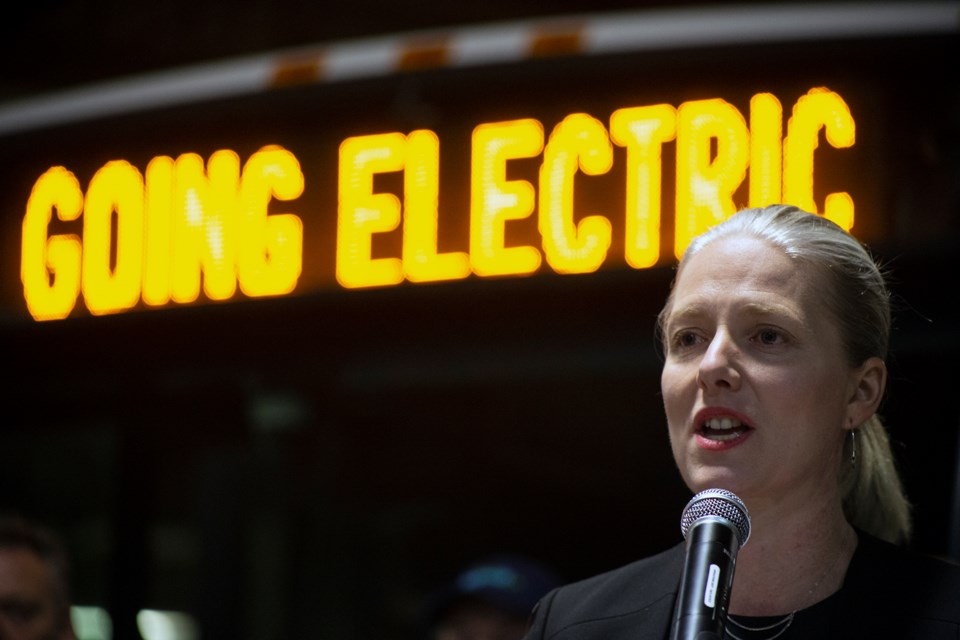Funding has been committed by all levels of government to convert most of the City of Guelph’s bus fleet from diesel to electric, with the city’s share of the projects coming in at just over $100 million.
Mayor Cam Guthrie said the projects will contribute greatly to Guelph’s goals to become a net zero community.
The announcement to convert much of the fleet to electric was made Thursday morning at the Guelph Transit Garage, led by Catherine McKenna, Canada’s minister of Infrastructure and Communities and Stephen Crawford, MPP for Oakville and parliamentary assistant to the province’s Minister of Infrastructure.
McKenna said Guelph’s switch to electric buses aligns with the Government of Canada’s commitment to adding 5,000 electric buses across the country.
She said Guelph’s move to replacing its fleet with electric buses is a significant step in tackling climate change.
“You are really showing to Canadians, to the world, what it looks like to be a city that cares about your carbon footprint and is looking at finding solutions — and they are very practical solutions,” said McKenna. “I will be telling this story across Canada, that Guelph is leading the way when it comes to clean energy transportation.”
In total, three projects were announced Thursday, with the first including the purchase of 35 long-range electric battery buses and the installation of on-route charging stations. During the announcement, Mayor Cam Guthrie said the procurement process for those first 35 buses will begin almost immediately.
The second project will include the purchase of 30 more electric buses in the future.
Lastly, a new bus storage facility in Guelph that could store up to 200 vehicles and will include charging stations for the buses will be completed. There is only room at the current Guelph Transit Garage on Watson Road South to add one charging station, city staff told council late last year when the electrification of the fleet was brought up at Guelph City Hall.
Guthrie said the new storage facility would likely be part of an operational hub the city plans to build in the near future.
In July, city staff told council the federal and provincial governments would support over 77 percent of the cost of electrifying the existing bus fleet if its application for funding was successful, but during Thursday’s event it was announced the City’s share of the projects would amount to over half, to the tune of $104 million.
During that meeting, council heard more than half of the city's carbon footprint comes from its fleet of vehicles, which includes its current 74 diesel buses. Last year the city announced Guelph Police Service's fleet of marked vehicles will be replaced with hybrid ones by 2023.
The province will cover $33 million toward the projects, while the Government of Canada is chipping in more than $40 million.
Speaking on behalf of the provincial government, Crawford said all levels of government will continue to work together to build a better foundation for the infrastructure across the province.
“On behalf of Premier Ford, the government of Ontario, I want to congratulate the City of Guelph for this enormous transformation — we are proud to be a part of it,” said Crawford.
Guelph MPP Mike Schreiner was at the announcement. In a statement, Schreiner said he is proud of Guelph for being a leader in showing people can be moved without buying fossil fuels.
“I urge the Ford government to make more funding available to all municipalities for green transit initiatives like this.” Said Schreiner.
Speaking to media immediately after the announcement, Guthrie said it is a positive to have the provincial and federal governments covering almost half of the cost for the projects.
“If someone were to say something costs a hundred dollars but I will pay fifty dollars of it, you take them up on that offer. That is exactly what the city is going to be doing,” said Guthrie.
The commitments from the other levels of government will help Guelph to implement the projects much more quickly than if it had to do it alone, said Guthrie.
“Having the other orders of government come here to provide funding helps us to move faster to get this implemented as quickly as possible for the citizens of Guelph,” said Guthrie. “We are very pleased that we won on this one,”
Robin Gerus, general manager of Guelph Transit, said some of the diesel buses in the existing fleet would need to be replaced anyway and will be the first to swapped for electric models.
“On a yearly basis, we have a certain number in our budget that get replaced when the life cycle gets completed. This will easily help us ensure as we replace buses, we are no longer putting diesel buses that will be here another 12 to 15 years. The replacement is with clean electric vehicles that will serve us for years to come,” said Gerus.
Thursday was one of the most exciting days in Gerus’ more than 40 years working in public transit. He said the move to electric buses will be transformational for the public transit employees and people of Guelph.
“This is a good day for all of us,” he said.
Gerus said he understands the cost of an electric bus is greater than a diesel one, but there are long-term benefits to making the switch, including lower operating costs and a quieter ride.
McKenna said there is both an environmental and economic case for going electric. The purchase of the buses will go to tender, but McKenna noted there are many Canadian companies that are leaders in the industry of electrified public transit.
“I see them around the world, but the sad thing is we weren’t seeing enough of them in Canada,” she said. “This is an opportunity to take action on climate change, to reduce emissions, to improve the quality of life and to grow our economy and create jobs.”
